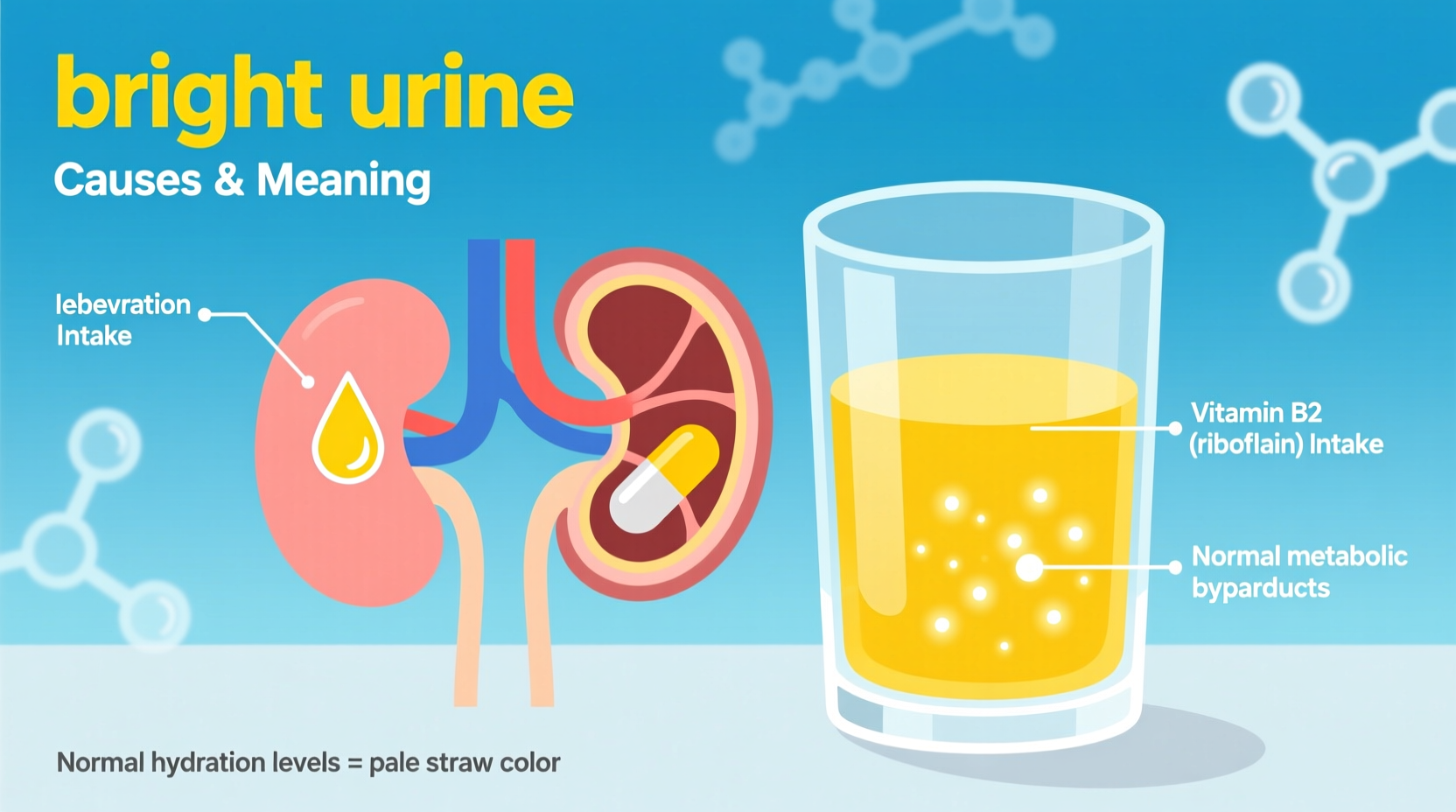Bright yellow urine is a common occurrence that many people experience at some point. While it often raises concern, in most cases, it’s not a sign of serious illness. The color of your urine can vary significantly based on hydration levels, diet, medications, and supplements. Understanding the reasons behind bright yellow urine helps distinguish between normal bodily responses and potential health issues.
Urine color is primarily influenced by a pigment called urochrome, which results from the breakdown of hemoglobin in red blood cells. When diluted with water, this pigment appears pale yellow. As concentration increases—due to less fluid intake—the color deepens. But when urine turns neon or fluorescent yellow, something else is usually at play.
Common Causes of Bright Yellow Urine

The most frequent reason for unusually bright yellow urine is high intake of B vitamins, particularly vitamin B2 (riboflavin) and vitamin B12. These water-soluble vitamins are essential for energy production, brain function, and red blood cell formation. Since the body cannot store excess amounts, any surplus is excreted through urine—often giving it a vivid yellow or even greenish tint.
- Vitamin B2 (Riboflavin): Found in multivitamins and B-complex supplements, riboflavin has a strong yellow-orange fluorescence that becomes visible in urine.
- Dehydration: Even mild dehydration concentrates urine, intensifying its natural yellow hue.
- Dietary factors: Foods like carrots, beets, and food coloring may influence urine color slightly, though they more commonly affect stool.
- Medications: Some antibiotics, laxatives, and chemotherapy drugs can alter urine color.
What Bright Yellow Urine Means for Your Health
In the vast majority of cases, bright yellow urine is harmless and temporary. It reflects either adequate vitamin absorption or slight under-hydration. However, interpreting urine color should involve context—consider recent dietary changes, fluid intake, and overall well-being.
When accompanied by symptoms such as fatigue, dizziness, dry mouth, or reduced urination, bright yellow urine may signal dehydration. In contrast, if it occurs while taking daily supplements without discomfort, it likely indicates efficient nutrient processing.
“Vivid yellow urine after taking a multivitamin is completely normal. It’s actually a sign that your body is absorbing the nutrients and excreting what it doesn’t need.” — Dr. Lena Patel, Nephrologist and Internal Medicine Specialist
Hydration vs. Supplementation: A Comparison
| Factor | Effect on Urine Color | Associated Signs | Recommended Action |
|---|---|---|---|
| High B-vitamin intake | Neon or fluorescent yellow | No other symptoms; occurs shortly after supplement use | No action needed unless excessive dosing |
| Mild dehydration | Dark yellow, concentrated | Thirst, dry lips, infrequent urination | Increase water intake gradually |
| Normal hydration | Pale straw yellow | Clear, frequent urination; no discomfort | Maintain current habits |
| Liver or bile duct issues | Dark brown or tea-colored | Jaundice, abdominal pain, nausea | Seek immediate medical evaluation |
When to Be Concerned: Red Flags
While bright yellow urine itself isn’t dangerous, certain accompanying symptoms warrant attention. Discoloration becomes concerning when paired with:
- Painful urination or burning sensation
- Fever or chills
- Swelling in the legs or face
- Unusual fatigue or confusion
- Abdominal pain, especially in the upper right quadrant
- Yellowing of the skin or eyes (jaundice)
If urine is consistently dark yellow despite high fluid intake and absence of supplements, it could indicate liver dysfunction or bile obstruction. Similarly, persistently foamy urine might suggest protein leakage, pointing to kidney involvement.
Mini Case Study: Sarah’s Morning Routine
Sarah, a 34-year-old office worker, began noticing her urine was intensely yellow every morning. She wasn’t concerned at first, but after weeks of the same pattern—even after drinking water upon waking—she consulted her doctor. Upon review, Sarah had started a new energy supplement containing high-dose B vitamins six weeks earlier. Her hydration was moderate, and she skipped breakfast most days.
Her physician explained that the combination of overnight dehydration and riboflavin excretion caused the vivid color. No lab tests were needed. Sarah adjusted her routine by drinking a glass of water before bed and switching to a lower-dose B-complex. Within two days, her urine returned to a light yellow shade.
How to Normalize Urine Color: A Step-by-Step Guide
- Assess your supplement intake: Check labels for riboflavin (B2), B12, or beta-carotene. Note dosage versus recommended daily allowance.
- Increase water consumption: Aim for at least 6–8 glasses per day, adjusting for climate and activity level.
- Monitor timing: Observe if color changes occur only in the morning (common due to overnight concentration).
- Adjust supplement timing: Take vitamins with meals and plenty of water to improve absorption and reduce pigment load in urine.
- Eliminate one variable at a time: Temporarily stop supplements to see if color returns to normal. Reintroduce slowly if desired.
- Consult a healthcare provider: If changes persist beyond a few days or are accompanied by symptoms, request a urinalysis or blood work.
FAQ: Common Questions About Bright Yellow Urine
Is bright yellow urine a sign of pregnancy?
Not directly. However, many prenatal vitamins contain high levels of B vitamins, especially B2 and folic acid, which can cause bright yellow urine. Increased fluid needs during pregnancy also make hydration status a factor.
Can I be dehydrated even if I drink water daily?
Yes. Factors like caffeine, alcohol, exercise, heat exposure, and illness increase fluid loss. If your urine remains dark yellow despite drinking water, you may need more than you realize. Monitor thirst, energy levels, and urination frequency.
Should I stop taking my multivitamin if my urine is bright yellow?
No, not necessarily. Bright yellow urine from B vitamins is normal and safe. However, avoid megadoses unless prescribed. The body excretes excess water-soluble vitamins, so there’s little benefit—and potential risk—from over-supplementation.
Prevention Checklist: Maintaining Healthy Urine Color
- ✅ Drink enough fluids throughout the day (urine should be pale yellow)
- ✅ Read supplement labels for riboflavin and other coloring agents
- ✅ Avoid doubling up on vitamins (e.g., multivitamin + separate B-complex)
- ✅ Urinate regularly and don’t hold it for extended periods
- ✅ Schedule annual physicals with basic kidney and liver function tests
Conclusion
Bright yellow urine is typically nothing to worry about—it’s often the result of good nutrition and proper vitamin absorption. The key is understanding the context: when it happens, what you’re consuming, and how you feel overall. Staying hydrated and using supplements wisely can help maintain a healthy balance.
If you're ever uncertain or experience additional symptoms, don't hesitate to consult a healthcare professional. Simple tests can rule out underlying conditions and provide peace of mind. Paying attention to your body’s signals, including urine color, is an easy yet powerful way to support long-term wellness.









 浙公网安备
33010002000092号
浙公网安备
33010002000092号 浙B2-20120091-4
浙B2-20120091-4
Comments
No comments yet. Why don't you start the discussion?